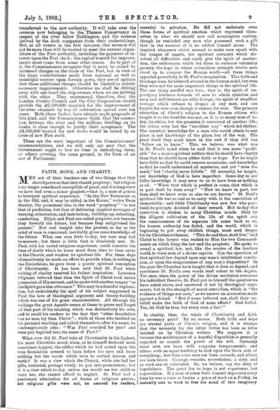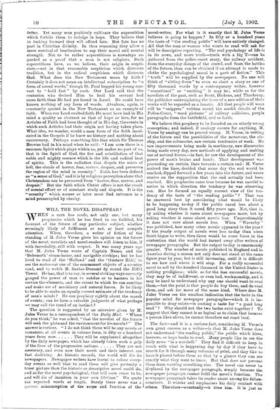FAITH, HOPE, AND CHARITY.
MEN ask of their teachers one of two things, that they should prove or that they should prophesy; but religion is no longer considered susceptible of proof, and it is long since we have had even a minor prophet,—that is, a man of genius to interpret spiritual experience. "In the New Testament as in the Old, and, it may be added, in the Koran," writes Dean Stanley, the prominent idea in the word "prophecy" "is not that of prediction, but that of delivering inspired messages of warning, exhortation, and instruction; building-up, exhorting, comforting. Elijah and Paul are called prophets, not because they foretold the future, but because they enlightened the present." But real insight into the present, so far as the mind of man is concerned, inevitably gives some knowledge of the future. What one man feels to-day, ten men may feel to-morrow; but there is little that is absolutely new. St. Paul, with his varied religious experience, could conceive the time of doubt which he knew must from time to time recur in the Church, and weaken its spiritual life. For these days of uncertainty he made an effort to provide when, in writing to the Corinthians, he gave them a purely spiritual conception of Christianity. It has been said that St. Paul when writing of charity received his fullest inspiration. Laurence Oliphant believed that then the Spirit of Christ took entire possession of His servant, and he spoke with another tongue " as the Spirit gave him utterance." This may be a fanciful explana- tion, but undoubtedly the spell of his subject suppressed in Paul the love of theological argument and theory-building which was one of his great characteristics. All through his writings the great Apostle seems at times to pause and forget all that part of his teaching which was distinctively his own, and to recall his readers to the fact that "other foundation can no man lay than Christ " ; while of those who insisted on his personal teaching and called themselves after his name, he contemptuously asks : "Was Paul crucified for you? and were you baptised into the name of Paul P"
What view did St. Paul take of Christianity in his highest, his most Christlike mood, when, as be himself declared must sometimes happen, the edifice which he had raised upon the true foundation seemed to burn before his eyes and leave nothing but the words which were to outlast heaven and earth ? It was a view which the Church, while she had her gifts, hesitated, perhaps wisely, to put into prominence; but it. is a view which to-Jay, unless she would see her children leave her, she cannot afford to neglect. St. Paul had a passionate admiration for all forma of religious genius ; but religious gifts were not, he assured his readers,
essential to salvation. He did not underrate even those . forms of spiritual emotion which expressed them- selves in what we should now call meaningless ranting, though he reminded any man who possessed such a gift that in the exercise of it he edified himself alone. The inspired eloquence which seemed to make men speak with the tongue of angels, the spiritual certainty, which dis- solved all difficulties and could give the spirit of martyr- dom, the enthusiasm which led them to embrace voluntary poverty, the hope in whose miraculous strength twelve men stood up to conquer the Roman world,—all these things appealed powerfully to St. Paul's imagination. This faith and this hope were, he believed, eternal in the human mind, but even they were not the most important things in the spiritual life. The one thing needful was love ; that is, the spirit of un- grudging kindness towards all men to which cynicism and envy and self-interest are alike foreign, the spirit of steadfast courage which refuses to despair of any man, and can forgive for ever even though it endure for ever. The primary attraction of Christ's religion to the Roman citizen who taught it to the Gentiles was not, as it is to many men of to- day, its ethics, but the promises it contained of another life ; the ethics were but the "excellent way" which led thither. The essential knowledge for a man who would attain to any place is not knowledge of the place, but of the way. The place itself they must know in the end if they will but "follow on to know." This, we believe, • was what was in St. Paul's mind when he said that it was more " profit- able " for a man's spiritual welfare that he should have charity than that he should have either faith or hope. For be might have faith so that he could remove mountains, and knowledge so that he could understand all mysteries, and yet "miss the mark," but "charity never faileth." Of necessity, he taught, our knowledge of God is here imperfect. Some day in our fuller knowledge it may seem to us to have been as nothing at all. "When that which is perfect is come, that which is in part shall be done away." "Now we know in part, but then shall we know even as also we are known." St. Paul's spiritual life was so real as to carry with it the conviction- of immortality; and while Christianity was new few who prac- tised its precepts doubted of their reward. But to-day this conviction is shaken in many Christian minds. Only by the diligent cultivation of the life of the spirit can the consciousness of its separate life come back to us, for human authority has failed, and the world, which is beginning to put away childish things, must seek deeper for its Christian evidences. "This do and thou shalt live," said Christ to the lawyer who recited to Him the two Command- ments on which Lang the law and the prophets. He spoke to reveal a spiritual law, not, like the oracles of the heathen world, to warn men of a divine caprice. Can the operation of that spiritual law depend upon any man's intellectual conclu- sion, or upon the sanguineness of any man's disposition? In the past the Churches have taught that it does so depend, and sometimes St. Paul's own words lend colour to the dogma. Yet once, when the power of the divine revelation overcame .his individual theories, St. Paul put to himself the question we have asked above, and answered it not by theological argu- ments, but in the strength of moral conviction, which is "the evidence of things not seen," as we answer an accusation made against a friend. "But if some believed not, shall their un- belief make the faith of God of none effect ? God forbid. Yea, let God be true, but every man a liar !"
Is charity, then, the whole of Christianity and .faith no necessary part? By no means. Both faith and hope are eternal parts of Christ's religion, and it is strange that the necessity for the latter virtue has been so little insisted on by Christian writers. We suppose it is because the maintenance of a hopeful disposition is generally regarded as outside the power of the will. Certainly some men are born with sanguine temperaments, and others with an equal tendency to look upon the black side of everything; but then some men are born cowards, and others are born brave. Courage remains, nevertheless, a duty, and as such can be cultivated. So, we believe, can the duty of hopefulness. The great foe to hope is not experience, but superstition. if a man of sense feels himself depressed every time be sees a crow or begins a piece of work on a Friday, he instantly sets to work to free his mind of this imaginary
fetter. Yet many men positively cultivate the superstition which forbids them to indulge in hope. They believe that in looking forward they will offend fate. But fate has no part in Christian divinity. In thus reasoning they allow a mere survival of heathenism to sap their moral and mental strength. Not to be rather superstitious is nowadays re- garded as a proof that a man is not religious. Such superstitions have, as we believe, their origin in scepti- eism,—not in that reasonable scepticism which distrusts tradition, but in the radical scepticism which distrusts God. 'What does the New Testament mean by faith ? Certainly it does not mean an intellectual subscription to "a form of sound words," though St. Paul begged his young con- vert to "hold fast" by such. Our Lord said that the centurion who desired Him to heal his servant had more faith than He had yet found in Israel. He could have known nothing of any form of words. Abraham, again, is constantly quoted in the New Testament as an example of faith. When our Lord exalted faith He must have had in His mind a quality as abstract as that of hope or love, for no Articles of Faith had been thought of in His day, the events in which such Articles had their origin not having taken place. What idea, we wonder, would a man form of the faith incul- cated in the Gospels if he knew no history and nothing about controversy. Perhaps something like that which Sir Thomas Browne had in his mind when he said : "I am sure there is a common Spirit which plays within us, yet makes no part of us, that is the Spirit of God, the fire and scintillation of that noble and mighty essence which is the life and radical heat of spirits. This is the radiation that dispels the mists of hell, the clouds of horror, fear, sorrow, despair, and preserves the region of the mind in serenity." Faith has been defined as "a Dense of God," and it is by religious perception alone that Christendom can be preserved from "horror, fear, sorrow, and despair." But the faith which Christ offers is not the result of mental effort or of constant study and dispute. It is the " serenity " which sooner or later must find entrance to a mind preoccupied by charity.















































 Previous page
Previous page